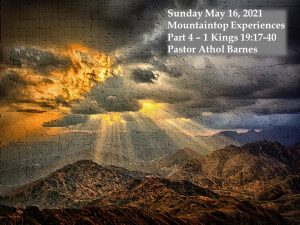
1 Kings 18:17-40
Have you ever tried walking on two different paths at the same time?
Under the leadership of King Ahab, Israel was walking two different paths, worshipping the one true God and worshipping idols and pagan religions. Ahab had married Jezebel who was the daughter of the pagan king of Sidon. She brought with her the pagan practices and idol worship of her homeland, and was aggressively promoting the idols of Baal and Asherah.
God had judged Israel by bringing about a famine and Elijah the prophet was used by God to confront Ahab and his wicked practices. The drought and famine brought the worship of this pagan god into question, and a perfect time for this standoff on mt Carmel to take place between Elijah and the prophets of the pagan gods.
Elijah was a bold and courageous prophet as he confronted the king who wanted to have him killed. But Elijah knew that he was protected by God. When you know who you represent you can be courageous.
Elijah then boldly calls a duel, telling the King to assemble the nation and the prophets of Baal and Asherah at mount Carmel. Ahab agreed, thinking that this would be the perfect time to have the nation turn against Elijah and have him killed.
The nation assembles at Carmel and Elijah makes this powerful statement in verse 21, “How long will you go limping between two different opinions?”
The prophets of Baal go first and spend most of the day in prayer and aggressive pleading to their god. It was to no avail and the skies were silent. Elijah exposes the false religion and taunts the prophets and mocks them (1 Kings 18:26-29).
Finally, Elijah stops the prophets in their futile effort and says to the people, “come near to me” (1 Kings 18:30). He wants them to observe closely the importance of what he is doing.
Elijah deliberately begins to repair the altar of sacrifice that had been demolished under the leadership of King Ahab. He takes twelve stones to build the altar representing the unity of the twelve tribes of Israel.
Exposing the foolishness and sin of Baal worship was only half of Elijah’s task for the day, his focus was bringing the nation back to worshipping the God of Abraham, the one true God. The first step was to repair the altar, the place of worship. In our lives, the first step to personal revival is the repairing of the personal altar of devotion.
During this season of COVID, many altars have been allowed to erode and are in need of repair. Maybe you once had a daily time set aside for prayer and reading the Bible, and maybe now is the time to rebuild that altar. Maybe you had a habit of praying together as a family, but schedules and business got in the way, the altar needs to be rebuilt. Maybe you had a discipline of worship and giving to the Lord, but your priorities changed, you need to rebuild those places of devotion to the Lord. What area of your life is God calling you back to wholehearted devotion?
Back to Carmel, the altar is rebuilt, and Elijah prepares the sacrifice. After soaking the sacrifice, Elijah prays. Prayer is the key to revival. There has never been revival without concerted prayer. Elijah prays what seems to be a simple prayer in 1 Kings 18:36-37 and God responds immediately by sending fire from heaven, consuming all the elements of the altar and the sacrifice. This was a powerful display of the glory of God, and the people responded with immediate repentance and worship (1 Kings 18:39). The prophets of Baal were quickly chased down and killed as the people turned from their wicked practices.
In our personal lives, it is not enough for us to acknowledge that “the Lord, He is God” (v. 39); we must also hate that which is evil and remove it from our lives. Judgment always prepares the way for blessing. Whether we acknowledge it or not, we all have idols in our lives, things that take the place of worshipping God. It could be our career, our relationships, entertainment, finances or many other seemingly harmless practices or possessions.
On a personal note, the first thing we turn to in the morning sets the tone for the day. If we open our phones and look at the latest news or social media feed, before we spend time in prayer, that could be an idol. What we turn to first thing in the morning, sets the tone for the day. Do we spend those first few moments focusing on the Lord, or do we fill our minds with fear, anxiety and the fear of man.
So the challenge for us is the same challenge that Elijah threw out to the nation of Israel, “are you limping between two opinions”
Whatever is more important in your life than knowing God, is an idol. The result for us is the same as it was for Israel, if we have a worship problem, we will experience drought and famine in our souls.
AW Tozer once said, “for the Christian, everything begins and ends with worship. Whatever interferes with one’s personal worship of God needs to be properly dealt with and dismissed.”
Our idols cause us to limp, we are weak in our devotion and weak in our witness for Christ.
What idol is the Holy Spirit challenging you to destroy today? It may be an app on your phone, your social media account, your spending habits, your viewing habits, or it may be your career.
What changes to your daily routine is God asking you to make today?
Hebrews12:1, “Therefore, since we are surrounded by so great a cloud of witnesses, let us also lay aside every weight, and sin which clings so closely, and let us run with endurance the race that is set before us,”


